
The culture of Moldova is unique and influenced by the Romanian origins of its majority population, as well as the Slavic and minority Gagauz populations. The traditional Latin origins of Romanian culture reach back to the 2nd century, the period of Roman colonization in Dacia.
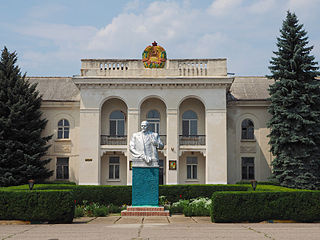
Dubăsari or Dubossary is a city in Transnistria, with a population of 23,650. Claimed by both the Republic of Moldova and the Transnistrian Moldavian Republic, the city is under the latter's administration, and functions as the seat of the Dubăsari District.

Oleg Serebrian is a Moldovan politician, writer, diplomat and political scientist, President of the Latin Union between 2010 and 2012.
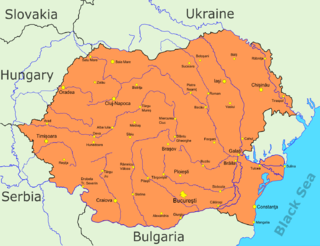
The unification of Moldova and Romania is a popular concept in the two countries that began during the Revolutions of 1989. The Romanian Revolution in 1989 and the independence of Moldova in 1991 further contributed to the development of a movement for the unification of the two Romanian-speaking countries. The question of reunification is recurrent in the public sphere of the two countries, often as a speculation, both as a goal and a danger. Though historically Romanian support for unification was high, a 2022 survey during the Russian invasion of Ukraine indicated that only 11% of Romania's population supports an immediate union, while over 42% think it is not the moment.

The Bessarabian Bulgarians are a Bulgarian minority group of the historical region of Bessarabia, inhabiting parts of present-day Ukraine and Moldova.

The history of the Jews in Moldova reaches back to the 1st century BCE, when Roman Jews lived in the cities of the province of Lower Moesia. Bessarabian Jews have been living in the area for some time. Between the 4th-7th centuries CE, Moldova was part of an important trading route between Asia and Europe, and bordered the Khazar Khaganate, where Judaism was the state religion. Prior to the Second World War, violent antisemitic movements across the Bessarabian region badly affected the region's Jewish population. In the 1930s and '40s, under the Romanian governments of Octavian Goga and Ion Antonescu, government-directed pogroms and mass deportations led to the concentration and extermination of Jewish citizens followed, leading to the extermination of between 45,000-60,000 Jews across Bessarabia. The total number of Romanian and Ukrainian Jews who perished in territories under Romanian administration is between 280,000 and 380,000.

Sîngerei is a city in Moldova and the seat of Sîngerei District. One village is administered by the city, Vrănești.

Parliamentary elections were held in the Moldavian SSR in February and March 1990 to elect the 380 members of the Supreme Soviet. They were the first and only free elections to the Supreme Soviet of the MSSR, and although the Communist Party of Moldova was the only registered party allowed to contest the election, opposition candidates were allowed to run as independents. Together with affiliated groups, the Popular Front of Moldova won a landslide victory. Candidates who were openly supporters of the Popular Front won about 27% of seats; together with moderate Communists, mainly from rural districts, they commanded a majority.
Ion Butmalai was a Moldovan politician and a deputy in the Parliament of Moldova from 2009 to 2014, member of the Liberal Democratic Party of Moldova.
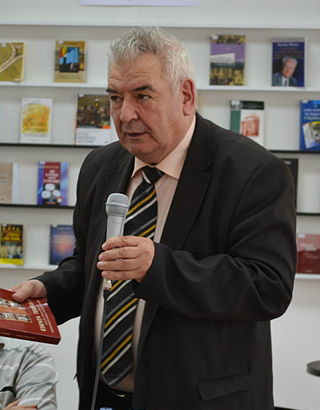
Mihai Cimpoi is a Moldovan politician, a distinguished cultural scientist, Romanian academician, critic and literary historian, eminescologist, literary editor and Bessarabian essayist. "Emeritus of the Republic of Moldova", two decades elected president of the Union of Writers of Moldova, deputy in the Parliament of the Republic of Moldova between 1999 and 2001, Mihai Cimpoi is the author of some fundamental works such as: "An Open History of the Romanian literature in Bessarabia" and "Mihai Eminescu. Encyclopedic Dictionary" - a unique monumental work. Mihai Cimpoi is the author and developer of the long-term project "The World Congress of Eminescologists", launched in 2012 and became a tradition.

Viaţa Basarabiei is a Romanian-language periodical from Chişinău, Moldova. Originally a literary and political magazine, published at a time when the Bessarabia region was part of Romania, it was founded in 1932 by political activist Pan Halippa and writer Nicolai Costenco. At the time, Viaţa Basarabiei was primarily noted for rejecting the centralism of Greater Romanian governments, to which they opposed more or less vocal Bessarabian regionalist demands and a nativist ethos.

Alexandru Robot was a Romanian, Moldovan and Soviet poet, also known as a novelist and journalist. First noted as a member of Romanian literary clubs, and committed to modernism and the avant-garde, he developed a poetic style based on borrowings from Symbolist and Expressionist literature. Also deemed a "Hermeticist" for the lexical obscurity in some of his poems, as well as for the similarity between his style and that of Ion Barbu, Robot was in particular noted for his pastorals, where he fused modernist elements into a traditionalist convention.
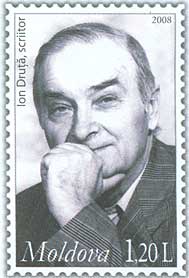
Ion Druță, also known as Ion Drutse, was a Moldovan writer, poet, playwright and literary historian. He was an honorary member of the Romanian Academy.
The Democratic Forum of the Romanians of Moldova is a civic movement, which brings together over 120 NGOs, several leading public organizations of Moldova and a whole number of academicians, writers, journalists. In 2006, the organization claimed 100,000 members.
Anton Grăjdieru was a journalist and politician from the Republic of Moldova. He served as a member of the Supreme Soviet of the Soviet Union.
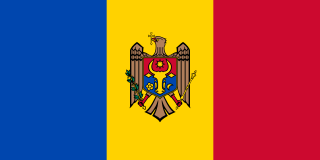
Literature of Moldova comprises the literature of the principality of Moldavia, the later trans-Prut Moldavia, Bessarabia, the Moldavian Autonomous Soviet Socialist Republic, the Moldavian Soviet Socialist Republic, and the modern Republic of Moldova, irrespective of the language. Although there has been considerable controversy over linguistic identity in Moldova, the Moldovan and Romanian languages are virtually identical and share a common literary history. Moldovan literature, therefore, has considerable overlap with Romanian literature.
This is a list of 1991 events that occurred in Romania.
Moldova participated in the Eurovision Song Contest 2016 with the song "Falling Stars" written by Gabriel Alares, Sebastian Lestapier, Ellen Berg and Leonid Gutkin. The song was performed by Lidia Isac. The Moldovan broadcaster TeleRadio-Moldova (TRM) organised the national final O melodie pentru Europa 2016 in order to select the Moldovan entry for the 2016 contest in Stockholm, Sweden. 47 entries competed to represent Moldova in Stockholm, with 24 being shortlisted to participate in the televised national final after auditioning in front of a jury panel. After two semi-finals and a final which took place in February 2016, "Falling Stars" performed by Lidia Isac emerged as the winner after gaining the most points following the combination of votes from a jury panel and a public televote.

Mișcarea Politică Unirea is a right-wing political party of the Republic of Moldova. It was founded on 15 January 2020, after the initiative of five parties to join forces to fight for the unification of Romania and Moldova. The party participated in the 2020 Moldovan presidential election with its candidate, Dorin Chirtoacă, finishing last after receiving 1.2% of the votes.













